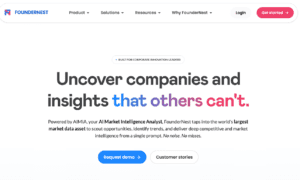In What Ways Does AI Contribute to Startup Scalability?
Unlock the secrets of how AI accelerates startup growth with in-depth analysis and insights from industry experts. Delve into the transformative power of AI across various business functions, from enhancing customer support to optimizing operational efficiency. This article sheds light on the pivotal role AI plays in driving scalability and innovation in today’s competitive startup landscape.
AI Automates Customer Support
AI technologies contribute to the scalability of startups by automating repetitive tasks and enabling smarter decision-making, freeing up resources to focus on growth and innovation. One great example is the use of AI-powered customer support tools like chatbots.
Take Intercom, for instance. By integrating AI-driven bots, startups can handle thousands of customer queries simultaneously without scaling their human support teams at the same pace. These bots use natural language processing to resolve common issues instantly or route more complex problems to the right person, ensuring efficient service while reducing operational costs.
This approach not only scales customer interactions as the startup grows but also gathers valuable data from these interactions, providing insights to refine products or services.
Chris Raulf, International AI and SEO Expert | Founder & President, Boulder SEO Marketing
AI Revolutionizes Hiring Processes
AI revolutionizes hiring processes, enabling startups to scale teams with unmatched speed and accuracy. It can analyze thousands of résumés, assess candidates, and predict cultural fit seamlessly. This ensures that scaling a workforce doesn’t compromise the quality or diversity of hires. AI also reduces onboarding times by automating training modules tailored to individual roles effectively. Startups grow faster when talent acquisition becomes an AI-powered strategic advantage.
When developing Toggl Hire, AI helped us create smarter candidate assessments tailored to skills. By analyzing test results, the system predicts a candidate’s success probability for specific roles accurately. This reduced hiring times for startups using Toggl Hire, helping them scale teams quicker. The scalability of the tool itself brought exponential growth to our user base globally. It’s proof of how AI-powered innovation fuels business expansion directly.
Alari Aho, CEO and Founder, Toggl Inc
AI Transforms Recruitment at X0PA
AI has completely transformed how we approach scaling in recruitment at X0PA. By tapping into a pool of 250 million profiles worldwide, we enable companies to discover top talent even before a single job post goes live. Our AI doesn’t stop at access-it curates profiles across LinkedIn and all major job boards, delivering a shortlist of only the most relevant candidates. This approach has saved recruiters over 100,000 days of manual effort, letting them focus on meaningful interactions instead of administrative tasks. Scaling with precision, speed, and reach is how we redefine modern recruitment.
Nina Alag Suri, CEO, XOPA AI
AI Boosts Productivity and Efficiency
The biggest contribution of AI integration, whether in startups or established industries, lies in its ability to boost productivity and efficiency. Tasks that once took ten steps can now be completed in 5 or even 3, empowering employees to multitask without compromising focus—a game-changer for startups.
In our case, integrating an AI chatbot for our real estate MLS website, The Canadian Home, was one of our best and most profitable decisions. As many of our users are first-time homebuyers, they naturally have countless questions. Initially, our customer support team was overwhelmed by the repetitive inquiries, making it hard to manage effectively. The AI chatbot now handles basic questions instantly, filtering out more straightforward queries and allowing our team to focus on more complex issues. This not only boosted efficiency but also increased conversions.
AI is already transforming industries worldwide, and its role will only grow in the future. Adapting to these advancements is not just smart, it’s essential.
Robin Cherian, CEO, The Canadian Home
AI Enhances Fraud Detection
In my experience, it enhances fraud detection for fintech startups. AI algorithms can quickly identify patterns and anomalies that could indicate potential fraudulent activity. AI-driven fraud detection systems like Feedzai or Kount analyze transactional data to identify suspicious activities. This saves time and resources for startups.
A payments startup scaled safely by using AI to monitor real-time transactions, reducing fraud rates and building customer trust without deploying a large fraud investigation team. According to Feedzai, their technology helped the startup increase revenue by 30% and save $1.5 million in fraud losses within a year.
I would point out that AI technologies help with fraud detection and assist in automating processes for startups. Many administrative tasks can be time-consuming and costly for startups, especially as they grow and onboard more customers or clients. AI-powered chatbots can handle common customer inquiries and support requests without the need for constant manual input from human employees.
Kevin Baragona, Founder @ DeepAI, Deep AI
AI Improves Lead Qualification
AI technologies help startups scale by automating repetitive tasks and providing insights that guide smarter decision-making. Startups often face limited resources, and AI allows teams to focus on high-value activities instead of getting stuck in operational bottlenecks.
We integrated AI into lead qualification. Instead of manually sorting and scoring leads, the AI models analyzed patterns from past sales data to prioritize prospects most likely to convert. This change reduced time spent on low-quality leads by 50 percent and allowed the sales team to focus on building relationships. Within six months, we saw a 30 percent increase in pipeline velocity.
V. Frank Sondors, Founder, Salesforge AI
AI Enhances Content Services
Our development of AI-enhanced content services revealed a crucial insight about startup scaling.
Combining AI efficiency with human expertise revolutionized our production capacity. Our HOTH AI Content Plus service slashed content creation time by 60% while maintaining quality standards. This breakthrough lets startups produce consistent, SEO-optimized content at scale without draining resources.
Numbers tell the scaling story. By integrating AI into our content workflow, we’ve helped startups produce in one month what used to take six months. The freed-up resources let them focus on growth strategies instead of content creation bottlenecks.
Success in scaling requires strategic AI adoption. We found that using AI to handle initial drafts while keeping human editors for refinement creates the perfect balance. This model lets startups maintain quality while scaling operations – a winning formula I’ve seen work across our 200,000+ client base.
My advice for startups: Start with one core process that directly impacts growth. Let AI handle repetitive tasks while your team focuses on strategy and creativity.
Marc Hardgrove, CEO, The Hoth
AI Empowers Efficient Scaling
AI technologies empower startups to scale efficiently by automating repetitive tasks and delivering data-driven insights that enhance decision-making. For instance, integrating AI-powered chatbots in customer support allows startups to handle thousands of queries simultaneously, reducing the need for large support teams while ensuring 24/7 service. One example is a SaaS startup I worked with that implemented an AI-based lead-scoring system, which prioritized high-quality leads for the sales team. This not only increased conversion rates but also optimized resource allocation, enabling the business to scale its sales operations rapidly without proportionally increasing costs.
Jayanti Katariya, CEO, Moon Invoice
AI Streamlines Customer Support
As someone who specializes in AI, I can say with confidence that AI adoption can really be a game-changer for startups. AI has two main advantages: it’s fast and cost-friendly. Anything that has to do with repetitive tasks can be automated with AI, saving the company tons of time and human effort. At the same time, the teams can then focus on more strategic tasks that require contextual understanding, which AI obviously lacks. This way the work is distributed between humans and AI according to the strengths of both. On top of that, tasks related to data collection and analysis can be performed even better by AI. It does it faster and more accurately because there’s no risk of human error. As a result, a well-executed adoption of AI can significantly speed up operations and improve the quality of work.
One example of a very common, yet extremely effective AI implementation is AI chatbots. We’ve integrated one on our website as well. It can totally improve your customer service without you needing to put extra hours or effort into it. Your clients have access to real-time support 24/7, which creates a better user journey and increases customer satisfaction, both of which contribute to conversions. The company, at the same time, can focus more on improving the core products and big picture strategizing.
Pavlo Tkhir, CTO at Euristiq, Euristiq
AI Automates Feedback Process
AI has been a game-changer for Brokee in scaling our platform effectively. One example is how we’ve integrated AI to automate the feedback process for our technical assessments. Instead of hiring additional team members to manually review every submission, our AI-driven system evaluates candidates’ performance, generates personalized feedback, and even suggests tailored follow-up questions for hiring managers.
This automation not only ensures consistency and fairness but also allows us to handle significantly more users without compromising quality. By removing the bottleneck of manual evaluation, we’ve been able to onboard more companies and engineers simultaneously, supporting our growth and expanding our impact in the hiring space. AI has made scaling not just possible but seamless.
Maksym Lushpenko, Founder, Brokee
AI Levels the Playing Field
AI technologies have been an amazing tool to level-set startups, especially given their low cost of implementation.
nDash is a bootstrapped company that often competes with brands well-funded by VCs. Integrations like OpenAI’s API have enabled us to offer similar services and features without the added cost of capital.
Machine learning was once accessible only to a few companies and has since been all but commoditized. We can now run powerful computations against large datasets that were all but impossible a few years ago. The biggest challenge is now just identifying implementations of value to content marketers and dreaming up the user interface.
Matt Solar, Cofounder & VP of Marketing, nDash Marketing
AI Transforms Customer Support
In my role at Windsor Drake, I once worked with a startup struggling to scale its customer support as their user base expanded rapidly. They were overwhelmed with routine Level 1 inquiries, and hiring more staff to keep up was becoming unsustainable. To address this, they integrated an AI-driven chatbot alongside cutting-edge voice AI technology to handle Level 1 customer requests. The voice AI, in particular, delivered human-like interactions that customers found surprisingly natural and well-received.
The impact was transformative. By automating Level 1 support, the startup freed up significant resources to focus on Level 2 and Level 3 support, where human expertise and problem-solving were crucial. This allowed them to address complex customer issues faster, improve overall service quality, and strengthen client relationships without increasing operational costs.
What stood out most was how capital-efficient this solution was. Startups often face tight budgets, and this AI integration allowed them to scale customer service without burning through resources. For software startups especially, where customer satisfaction can make or break growth, leveraging AI for customer support isn’t just a nice-to-have—it’s becoming a competitive necessity. The combination of cost-efficiency, scalability, and customer approval makes this a game-changing development that startups should actively explore.
Jeff Barrington, Managing Director, Windsor Drake
AI Increases Marketing Scalability
The integration of AI technologies has dramatically increased the scalability of startups, particularly in marketing. Where previously a five-person team might have been necessary, many tasks can now be efficiently handled by a single individual, thanks to AI-powered tools.
This shift is particularly impactful for bootstrapped businesses, as it allows them to scale more profitably with less need for large teams or significant investment. AI enables startups to operate lean while still achieving impressive results.
A concrete example from my experience is in email marketing. We used AI tools like Claude.ai to craft highly optimized onboarding sequences aimed at converting sign-ups into active clients. This whole process took about 2 hours, whereas previously this would have taken weeks. The quality of the AI-generated content was exceptional, and it significantly boosted our conversion rate from 30% to 38%.
This is just one instance of how AI can drive tangible improvements. Similar efficiencies can be found across various marketing functions, from content creation to data analysis and campaign optimization.
Startups can now achieve the output and quality of much larger teams, allowing them to compete more effectively and scale more rapidly without proportional increases in headcount or costs.
Tom Van den Heuvel, CMO, wetracked.io
AI Enables Unbelievable Automation
There is nothing that has improved our ability to scale startups like AI. You can write a Python script for any task, we have MCP setups (Model Context Protocol) that can access apps and programs on your Mac/PC to perform a plethora of tasks. It’s really unbelievable. You just think of what you want automated and AI will make it happen. Sam Altman of OpenAI says we may see the first billionaire solo entrepreneur due to AI. Exciting times.
Nader Jaber, Founder, FlyNumber
AI Optimizes Operational Efficiency
The integration of AI technologies plays a pivotal role in enabling startups to scale by optimizing operational efficiency and fortifying cybersecurity measures. It can also be used to automate routine processes and proactively address potential challenges. For businesses, this means reducing manual workload, improving resource allocation, and ensuring a secure foundation for growth. AI also enhances real-time decision-making by providing actionable insights from data, which is critical for scaling operations effectively without overburdening resources.
At GO Technology Group, we worked with an industrial manufacturing client in Chicago to implement an AI-enhanced cybersecurity solution that monitored their network 24/7 for anomalies. This allowed the organization to detect and respond to threats in real time, preventing potential breaches and downtime. The integration of AI not only streamlined their security operations but also freed up IT staff to focus on strategic initiatives, demonstrating how AI-powered managed IT services can drive both scalability and resilience in startup environments.
Steve Robinson, Senior Technical Manager, Go Technology Group
AI Drives Adaptive Pricing Models
One way AI drives scalability is through adaptive pricing models. I’m not strictly talking about automating price changes but using AI to dynamically respond to market conditions, customer behavior, and inventory levels in real time, creating a competitive edge that startups often overlook.
For example, I worked with a SaaS startup that used AI to analyze customer segments, competitors’ pricing, and seasonal demand patterns. Other than optimizing pricing for revenue, the system adapted to prioritize user acquisition in low-demand periods while maximizing revenue during peak times.
During a major product launch, the AI model identified that a slightly lower introductory price for one user segment (freelancers) drove a 25% higher conversion rate while maintaining profitability because of the predicted long-term subscription retention. For larger enterprise clients, the AI suggested bundling features with tiered pricing, increasing adoption by 18% compared to static pricing.
When you allow AI to continuously refine pricing, you can reduce churn rates and optimize customer acquisition costs, all without needing a massive pricing team or constant manual analysis. I’d say you must explore adaptive pricing AI early. It’s a strategic lever that can simultaneously improve margins and customer loyalty in ways static strategies simply can’t.
Aljay Ambos, Lead SEO & Marketing Consultant, Twixify
Related Articles
- How AI Is Driving Innovation in Startups – TechBullion
- Ankit Maloo Explains How AI and New Tech Will Reshape Startup Growth
- Redefining Scalability: The Intersection of AI and … – TechBullion



































